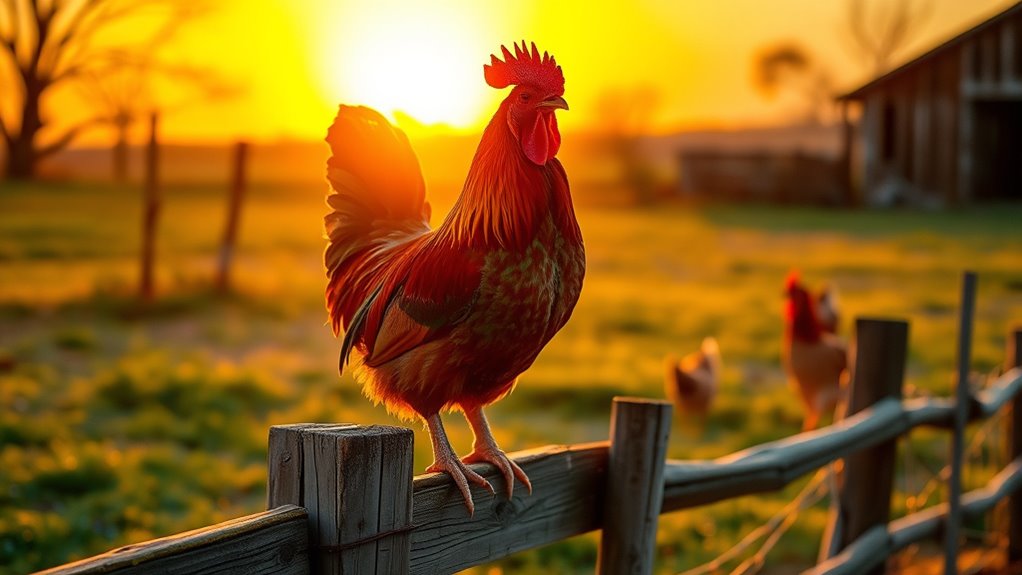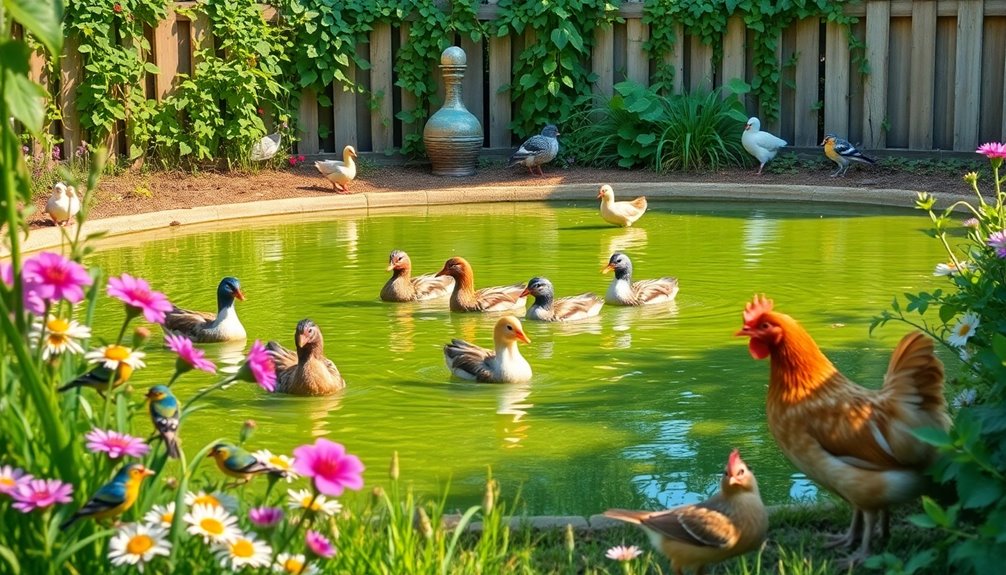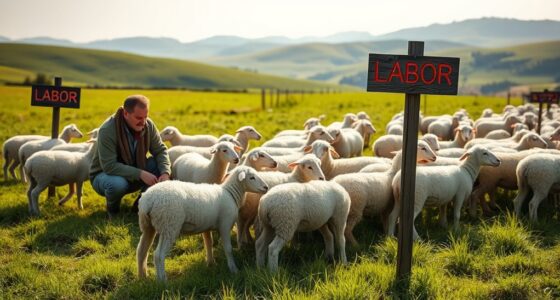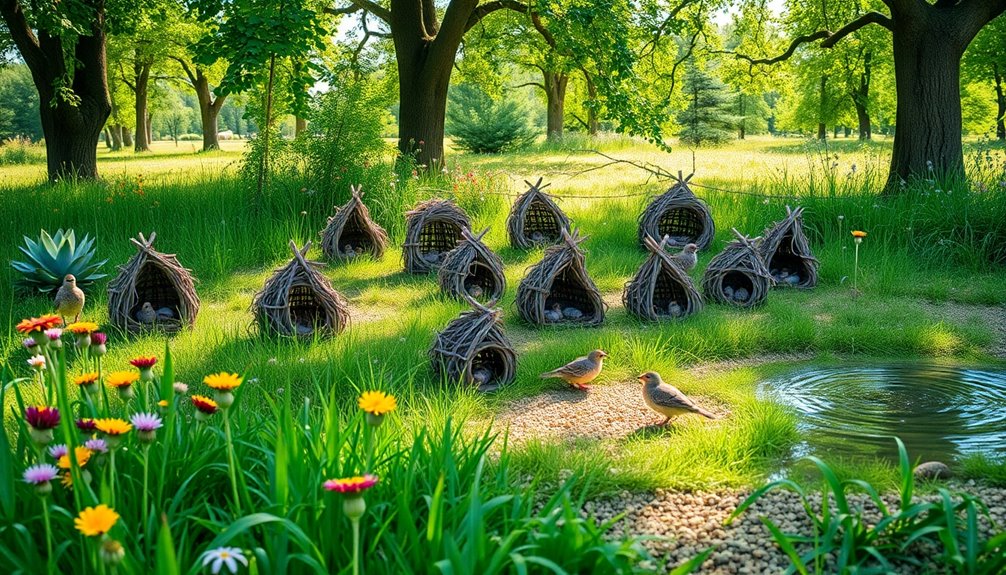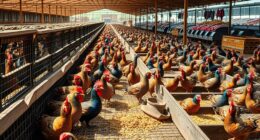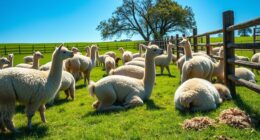Roosters usually start crowing between 4 to 6 months old, with the average being around 5 months. Factors like breed, social interactions, and lighting can influence when a rooster begins to crow. Smaller breeds, like bantams, often crow earlier than larger ones. This vocalization is vital for asserting dominance and attracting mates. If you're curious about what else affects crowing and how to manage your roosters, there's plenty more to discover on this topic!
Key Takeaways
- Roosters typically start crowing between 4 to 6 months old, with most averaging around 5 months for onset.
- Some roosters may begin to crow as early as 3 months or as late as 10 months, depending on breed.
- Smaller breeds, like bantams, tend to crow earlier than larger breeds due to faster maturity rates.
- Factors such as light exposure, social structure, and the presence of other roosters can influence crowing behavior.
- Proper nutrition and stress management are essential for healthy vocal development in roosters.
Understanding Rooster Development

Understanding rooster development is essential for anyone raising these fascinating birds. The journey begins in the egg, where the embryo takes about 21 days to develop, drawing nutrients from the yolk.
Once hatched, chicks rely on warmth and protection for up to eight weeks, growing soft feathers and beginning to socialize. As they transition into the juvenile stage, which lasts from eight to twenty weeks, they start developing sexual characteristics and engage in mock fighting. During this time, early crowing may occur.
Throughout these stages, environmental factors, proper nutrition, and stress management play crucial roles in their overall health and growth. Paying attention to these aspects ensures that your roosters develop strong and healthy.
The Age Range for Crowing

As roosters grow and develop from chicks into juveniles, one of the exciting milestones you'll encounter is their crowing.
Typically, roosters start crowing between 4 to 6 months old, with most averaging around 5 months. However, some may surprise you by crowing as early as 3 months, while others mightn't start until they're about 10 months old.
Roosters typically begin crowing between 4 to 6 months, with some starting as early as 3 months or as late as 10 months.
Different breeds can also influence this age range; smaller breeds like bantams tend to crow earlier than larger ones.
It's essential to keep an eye on your roosters during this time, as their vocalizations mark a significant step in their development and social interactions within the flock.
Factors Influencing Crowing Onset
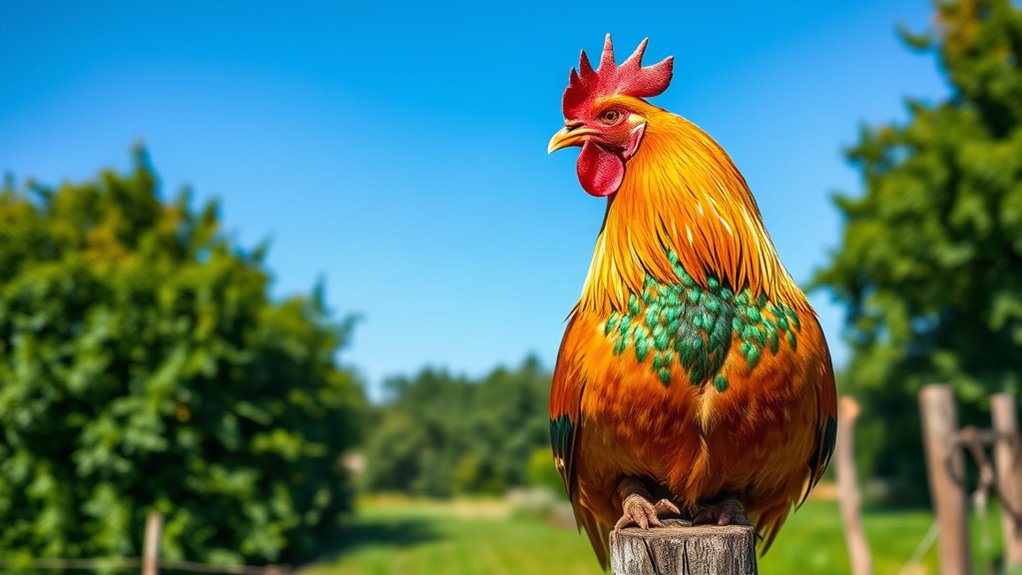
Several factors influence when your rooster begins to crow, and these can vary significantly based on breed, environment, and social dynamics.
Different breeds mature at different rates; for instance, bantams tend to crow earlier than larger breeds like Rhode Island Reds.
Light exposure also plays a crucial role; artificial lighting can trigger crowing outside natural dawn times, while seasonal changes in daylight affect overall vocalization.
The social structure within the flock matters too—dominant roosters usually crow first, and the presence of other roosters can encourage more frequent crowing.
Lastly, stress and proper nutrition are vital; a stress-free environment and balanced diet support healthy vocal development, ensuring your rooster starts crowing at the right time.
The Process of Learning to Crow
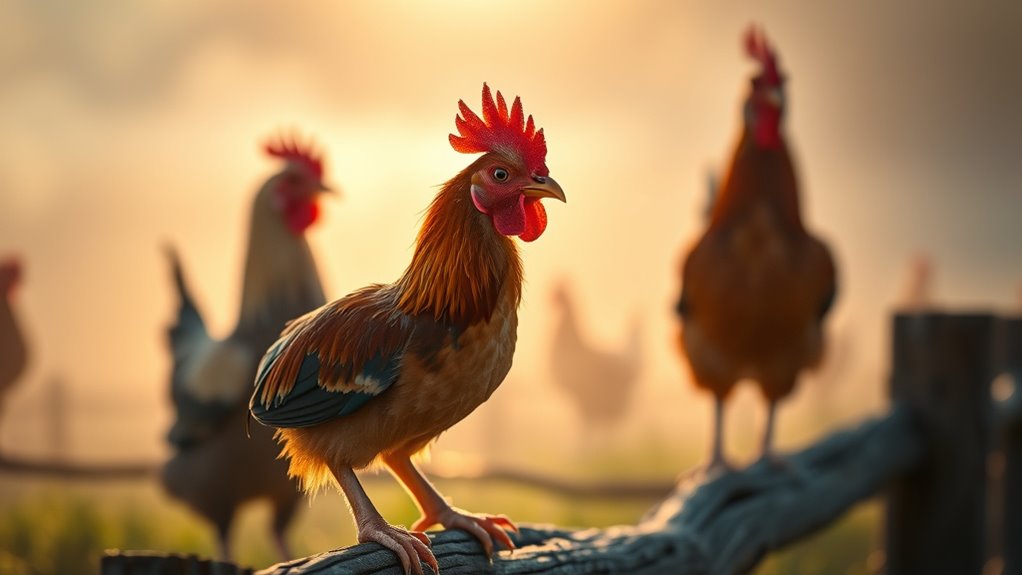
While many people assume that roosters instinctively know how to crow, the truth is that the process of learning to crow is gradual and influenced by various factors.
Typically, roosters start vocalizing around 3 to 4 months, initially producing soft chirps or wheezes. This innate behavior develops without direct imitation from others.
By 5 to 6 months, most roosters achieve full crowing ability. Environmental influences, such as social interactions and external stimuli, can also impact the timing and quality of their crowing.
As roosters mature, hormonal changes and brain development play significant roles in enhancing their vocalization skills.
Reasons Why Roosters Crow

Roosters crow for a variety of reasons, each rooted in their instinctual behaviors and social dynamics. They assert dominance within their flock, with the dominant rooster crowing first to establish hierarchy.
Roosters crow to establish dominance and hierarchy within their flock, showcasing their instinctual social behaviors.
Crowing also marks territory, warning other animals of their presence. When threats arise, roosters use specific crows to alert their flock. Additionally, they crow to attract females, signaling their health and fitness to impress hens.
This vocal display helps maintain social interactions and coordinate movements within the flock. Roosters even crow around feeding times, asserting dominance over food resources and announcing mealtime.
Their internal biological rhythms play a role too, regulating crowing patterns throughout the day, often before dawn.
Environmental Influences on Crowing
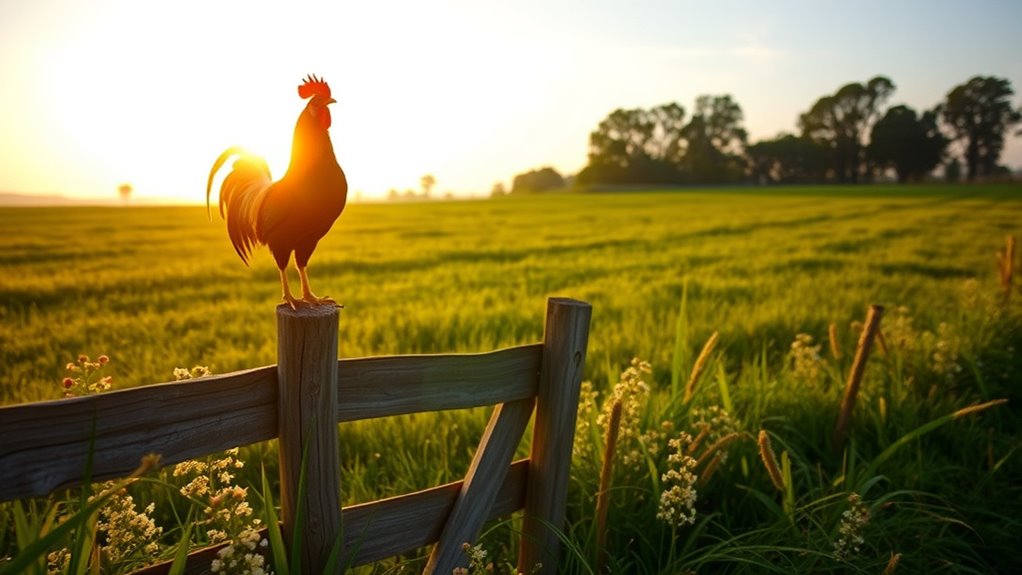
When it comes to crowing, environmental factors play a crucial role in shaping a rooster's behavior.
Light exposure significantly influences when and how often your roosters crow. If natural dawn is absent, they may respond to supplemental light in their coops, mimicking morning conditions.
Additionally, social dynamics can affect crowing; dominant roosters typically crow first, encouraging others to join in.
Trigger noises, like vehicle sounds, can startle them into crowing, especially at night.
Seasonal changes also matter; expect increased crowing during spring and reduced activity in winter.
Lastly, a stress-free environment fosters natural crowing, while health issues or instability can hinder their vocalizations.
Keep these factors in mind to understand your roosters better.
Breed Variations in Crowing Age
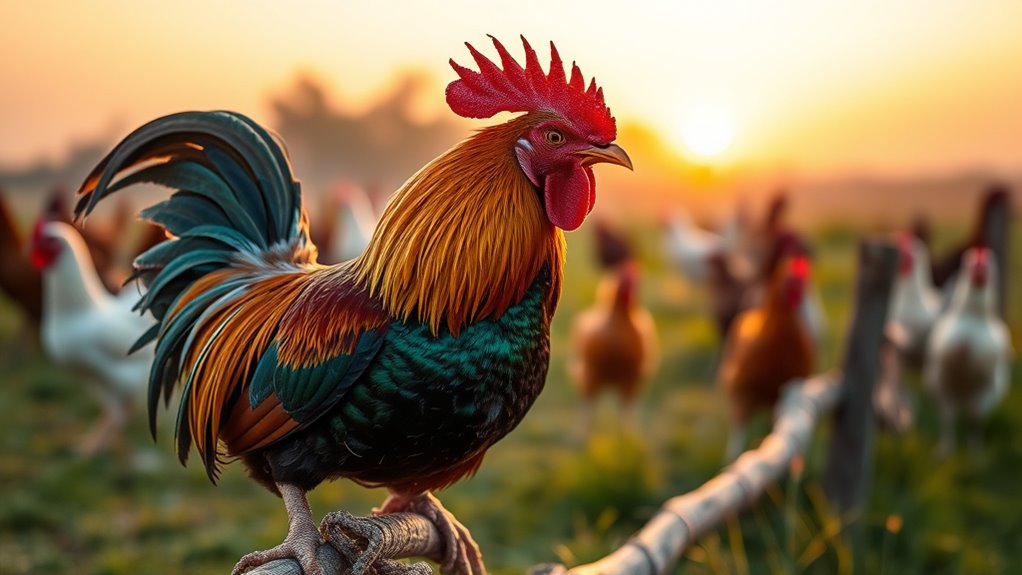
Understanding the age at which different breeds of roosters start crowing can help you choose the right variety for your flock.
Breeds mature at different rates, so you'll notice bantams often crow as early as three months, while larger breeds like Rhode Island Reds may not start until around five to six months.
Size plays a significant role; generally, larger breeds mature more slowly.
Genetic factors also influence crowing age, meaning some breeds may consistently show earlier or later onset.
Even within a single breed, individual roosters can vary in their crowing age.
The Role of Nutrition and Health
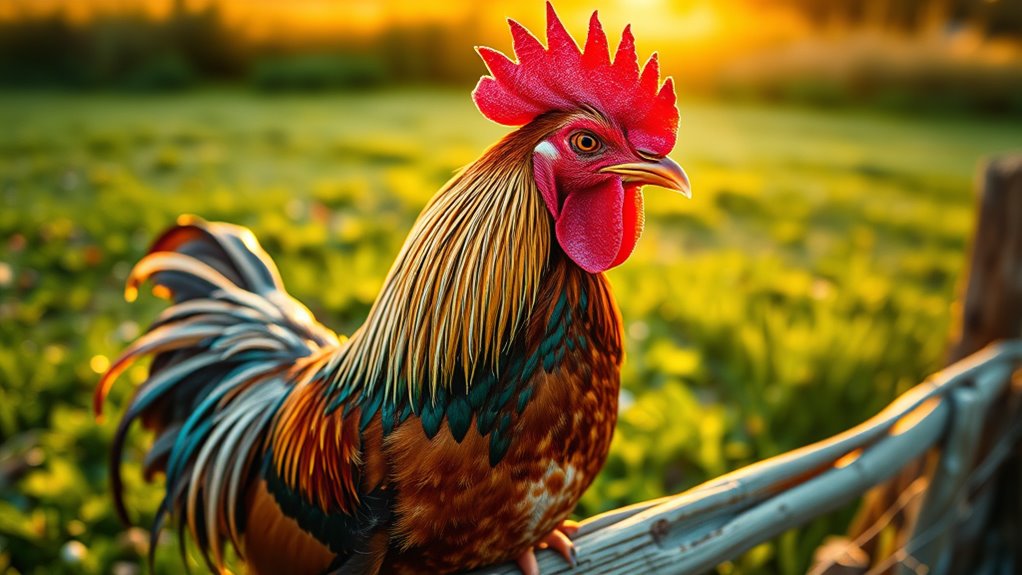
Choosing the right breed of rooster is just the start; their nutrition and health play a significant role in their development and crowing behavior.
A high-protein diet is crucial for muscle growth, ensuring your rooster develops properly and can crow effectively. Nutritional deficiencies can delay crowing and other milestones, so maintaining a balanced diet with essential vitamins and minerals is key. Regular feeding schedules not only promote consistent growth but also lower stress levels. Stress from poor health or environmental factors, like noise or overcrowding, can hinder crowing.
Ensure your rooster has access to fresh water and a clean environment, as these factors significantly impact overall well-being and vocal development, encouraging him to crow with confidence. Additionally, proper nutrition is essential for minimizing health risks and promoting longevity in your rooster's life.
Management Tips for Encouraging Crowing
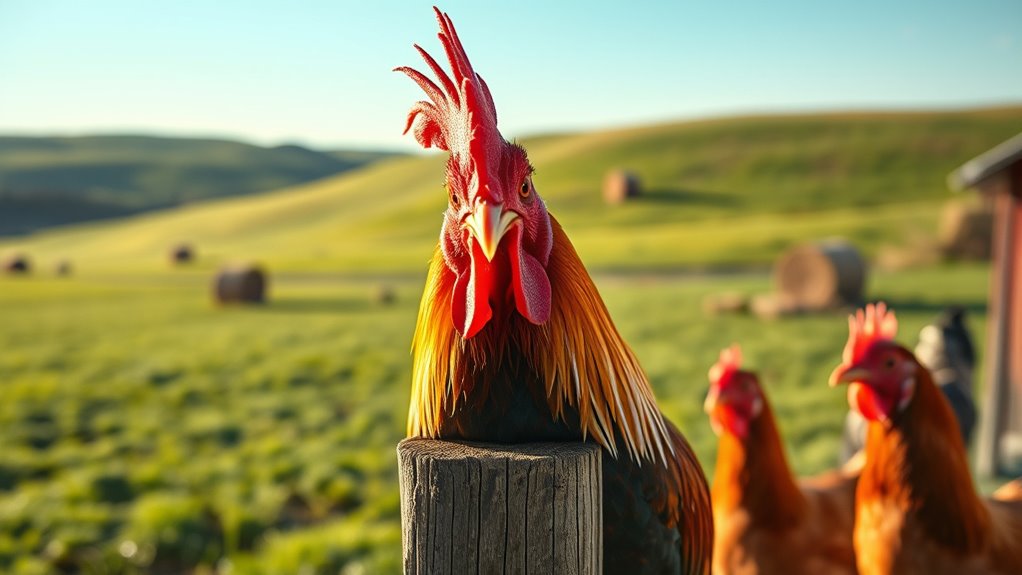
To encourage your rooster to crow more confidently, it's essential to create an environment that minimizes stress and promotes healthy social interactions.
Start by adjusting lighting to mimic natural day-night cycles and ensure your coop is spacious to reduce competitive crowing. Insulate the coop and surround it with trees to muffle external noises.
Adjust lighting to reflect natural cycles and ensure your coop is spacious to minimize competitive crowing and external disturbances.
Introduce other roosters to establish a flock hierarchy and encourage interaction among your chickens to foster community. Reward quiet behavior with treats and maintain consistent daily routines to promote calmness.
Consider using a No Crow Collar for volume control. Lastly, choose quieter breeds to help manage crowing levels effectively, and engage with neighbors to foster understanding about your rooster's vocalizations.
Frequently Asked Questions
Can Hens Crow Like Roosters?
Yes, hens can crow like roosters! While it's less common, some hens may exhibit this behavior, especially if they're asserting dominance or if there's no rooster around.
You might notice dominant hens crowing to challenge the pecking order. It's important to keep an eye on them, as crowing can also signal health issues or hormonal changes.
If you hear a hen crowing, it could be a sign of her unique personality or circumstances!
Do All Rooster Breeds Crow?
Imagine a symphony of morning sounds, where every rooster plays its unique note.
Yes, all rooster breeds crow, but they each have their own style and timing. Some may burst into song early, while others take their time.
Factors like breed and environment shape how and when they crow.
How Loud Can a Rooster Crow?
Roosters can crow quite loudly, often reaching decibel levels that can be heard from afar.
The volume varies between breeds and individuals; some may boast a powerful crow, while others are more subdued.
Environmental factors, like stress, can also influence how loud they get.
You might notice your rooster crowing more assertively when establishing dominance or responding to threats.
Does Crowing Differ Between Day and Night?
Crowing does differ between day and night.
During the day, you'll notice roosters crowing frequently in response to various stimuli, like noises or social interactions. They often establish their dominance within the flock this way.
At night, however, crowing can occur due to disturbances or changes in their environment. It's less common, but if something surprises them, you might hear a rooster crowing well into the night.
Can a Rooster Stop Crowing?
Can you imagine a world without the iconic sound of a rooster crowing?
While it's tough to completely stop a rooster from crowing, you can take steps to reduce it. Insulating the coop, managing light exposure, and even using sound masking can help.
However, remember that crowing is a natural behavior tied to their instincts. So, while you can lessen it, you probably won't eliminate it entirely.
Conclusion
In conclusion, your rooster's crowing journey starts around 5 to 6 months, but various factors can shape when he finally finds his voice. Just like a teenager discovering their talents, each bird has its unique timeline. By providing proper care and a supportive environment, you can encourage your feathered friend to crow confidently. So, keep those ears perked and enjoy the symphony of your backyard as your rooster grows into his role as the morning alarm clock!

